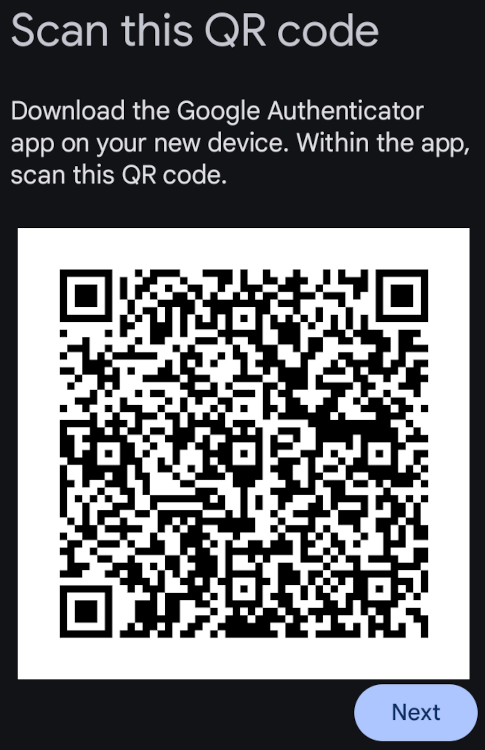In the ongoing effort to extricate myself from Google's services, I've been paring down my usage of their apps on my (admittedly Android) phone. I'm now down to two Google apps I use regularly: Maps (for traffic data) and Authenticator (for TOTP[A]Time-based One Time Password codes).
Now, I spend most of my time in a terminal window on MacOS or connected to a Linux machine; it'd be nice if I could get TOTPs on the command-line, and it turns out there's a utility called oathtool that allows for TOTP generation on the CLI. However, that would mean switching my OTP provider, which usually involves:
- Logging into each service that has an OTP registered in the app;
- Disabling two-factor authentication (2FA);
- Re-enabling 2FA and using the "manual entry" code as input to
oathtool; - Doing it all again for the next website or service.
Fortunately, Google's Authenticator provides a way to migrate codes between instances of the app based on scanning QR codes, and we can use this to migrate them away from Google into a TOTP handler of our choosing. It's another four-step process:
- Generating a QR code in Google Authenticator for the codes you want to export;
- Decoding the QR somewhere off-device, into a URL;
- Decoding the URL into its constituent services and secret values;
- Setting up
oathtoolto use the secrets.
Note that the below steps are presented just as I went through them, you may be able to find efficiencies or you may run into troubles that I didn't (especially if you're trying this exclusively on Windows); "your mileage may vary" is apt here.
Going from Authenticator to a migration URL
The first step is getting the code out of Authenticator, through the Transfer Codes menu option in the app. Picking the services you'd like to extract leads you to a code like this:

Unrivalled padding between the QR and Next button
You may have an app on your phone that decodes QRs, but I don't; instead, I transferred the file to my MacOS machine over Tailscale, and used a command-line tool called qrtool to get the QR content:
Decoding the migration QR
$ brew install qrtool $ qrtool decode Screenshot_20250901_062719_Authenticator.jpg otpauth-migration://offline?data=CjwKC2kqSJnNaAyKkw6jEhJUaGUgUmlja3JvbGwgU3RvcmUgASgBMAJCEzg4Yzg5ZTE3NTY3MDQzOTE0MzkQAhgBIAA%3D
Decoding the URL into secrets
So we have our migration URL, with a Base64-encoded data block. Unfortunately, if we were to simply decode the data, we'd end up with some binary gibberish:
Trying to decode the URL directly
$ php -r 'var_dump(base64_decode("CjwKC2kqSJnNaAyKkw6jEhJUaGUgUmlja3JvbGwgU3RvcmUgASgBMAJCEzg4Yzg5ZTE3NTY3MDQzOTE0MzkQAhgBIAA%3D"));'
string(69) "
<
i*H??h??ý
It turns out that this is a Protobuf-encoded data string, and we need to use Google's Protobuf library to get the data out. It turns out Tim Brooks has already done this with a short piece of Python at: https://github.com/brookst/otpauth_migrate
I decided to install this on a Linux machine I tend to be connected to (entirely unrelated to my Python installation being broken on Mac...):
Extracting the data via otpauth_migrate
$ git clone https://github.com/brookst/otpauth_migrate $ cd otpauth_migrate $ ./otpauth_migrate.py otpauth-migration://offline?data=CjwKC2kqSJnNaAyKkw6jEhJUaGUgUmlja3JvbGwgU3RvcmUgASgBMAJCEzg4Yzg5ZTE3NTY3MDQzOTE0MzkQAhgBIAA%3D secret: "i*H\231\315h\014\212\223\016\243" name: "The Rickroll Store" algorithm: ALGORITHM_SHA1 digits: DIGIT_COUNT_SIX type: OTP_TYPE_TOTP Secret code = NEVERGONNAGIVEYOUM======
This tool is intelligent enough to extract any number of names and secrets from a migration URL, so you can export all your codes from Authenticator into one giant QR without needing to do each separately.
Using oathtool to generate OTPs
The final step is to use this secret code with oathtool, which takes the secret directly as a parameter. If you instead want to refer to the service by name, Michael Bushey[1]"CLI 2-Factor Authentication", Michael Bushey, 2023 has a quick wrapper script which extracts the secrets from a locally-stored file:
Wrapper script to generate OTPs: /usr/local/bin/otp
#!/bin/bashOTPKEY="$(sed -n "s/${1}=//p" ~/.otpkeys)" if [ -z "$OTPKEY" ]; then echo "$(basename $0): Bad Service Name '$1'" exit fi date oathtool --totp -b "$OTPKEY"
OTP key store: ~/.otpkeys
rickroll=NEVERGONNAGIVEYOUM======
With this in place, you won't need to use your Authenticator app again. The tool outputs the current date and time, so you can double-check that your code won't expire (at :00 seconds) before you get a chance to type it in:
$ otp rickroll Mon Sep 1 07:10:42 AM UTC 2025 200213
Future expansion
There's a security issue here, of course, which is the exposed secret key sitting in a file on-disk. I'm happy to sit with that and not require a password to generate OTPs every time, but if you're interested in adapting the wrapper script to use symmetric encryption to secure the keys, Vivek Gite[2]"Use oathtool Linux command line for 2 step verification (2FA)", Vivek Gite, updated Feb 2025 has a set of scripts which employ gpg for the job.
Now I just need to find a way to get traffic data into a maps App that doesn't involve Google's servers... Thoughts welcome.